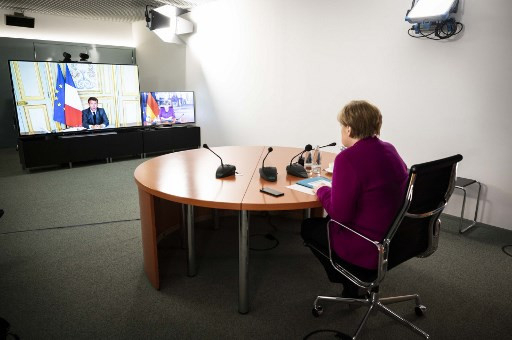Popular Reads
Top Results
Can't find what you're looking for?
View all search resultsPopular Reads
Top Results
Can't find what you're looking for?
View all search resultsMacron, Merkel agree 500 billion euro EU virus recovery plan
Countries benefiting from the financing would not have to repay the money, Macron added, emphasizing that the funds "were not loans."
Change text size
Gift Premium Articles
to Anyone
 This Handout photo made available by the German government's press office shows German Chancellor Angela Merkel speaking with French President Emmanuel Macron, via video link, at the Chancellery in Berlin, Germany, on May 18, 2020 on the effects of the novel coronavirus COVID-19 pandemic. (Bundesregierung/AFP/Sandra Steins)
This Handout photo made available by the German government's press office shows German Chancellor Angela Merkel speaking with French President Emmanuel Macron, via video link, at the Chancellery in Berlin, Germany, on May 18, 2020 on the effects of the novel coronavirus COVID-19 pandemic. (Bundesregierung/AFP/Sandra Steins)
F
rance and Germany proposed Monday a 500 billion euro ($542 billion) fund to finance the recovery of the European Union's economy from the devastation wrought by the coronavirus crisis.
Putting aside past differences and seeking to prove that the Franco-German core of Europe remains intact, President Emmanuel Macron and Chancellor Angela Merkel announced the unprecedented package after talks by video conference.
With the European economy facing its biggest challenge since World War II, Macron also acknowledged that the EU had fallen short in its initial response to the virus and needed to coordinate more closely on health.
Financed by "borrowing from the market in the name of the EU," the money will flow to the "worst-hit sectors and regions" in the 27-member bloc, the two countries said in a joint statement.
"We are convinced that it is not only fair but also necessary to now make available the funds... that we will then gradually repay through several future European budgets," Merkel said.
Countries benefiting from the financing would not have to repay the money, Macron added, emphasizing that the funds "were not loans."
'More solidarity'
The borrowing marks a major shift by Germany, which has until now rebuffed calls by Spain and Italy for so-called "coronabonds" for joint borrowing on financial markets to provide stimulus cash.
Germany, the Netherlands and other rich countries had seen them as an attempt by the indebted south to unfairly take advantage of the north's fiscal discipline.
But Merkel said the seriousness of the crisis meant that "solidarity" must be the order of the day.
"The aim is to ensure that Europe comes out of the crisis more cohesive and with more solidarity," she said, calling the proposal "courageous."
European Commission chief Ursula von der Leyen, who would have to help implement the package, hailed the plan as a "constructive proposal."
"It acknowledges the scope and the size of the economic challenge that Europe faces," she said.
European sources told AFP last week the Commission would lay out its plan toward the end of May, hoping both to reconcile the opposing objectives while proving that European solidarity is more than just a lofty slogan.
'Learn the lessons'
Macron said stronger European coordination on health issues must be a priority, admitting that the EU fell short in its initial response to the coronavirus outbreak.
"Europe was without doubt put at fault at the beginning of this crisis," Macron said.
He added that unilateral steps by some EU countries to close borders -- without consulting their neighbors -- had given a "sad image" of Europe.
He said Europe needed "very concrete capacities" to handle health crises with shared stocks of masks and tests, and prevention plans to combat epidemics.
"A Europe of health -- which has never existed -- has to be our priority," he said. "We need to learn all the lessons from this pandemic."
In a sign of how the pandemic has changed global diplomacy, their joint press conference saw them stand at lecterns in cities hundreds of kilometers apart, with Merkel in Berlin and Macron in Paris.
Europe is just beginning to emerge from the lockdowns to halt the outbreak, which has taken a huge bite out of national economies and raised the prospects of damaging recessions that could last for months or even longer.
But despite widespread recognition that the hardest-hit countries will be unable to repair the economic damage on their own, divisions among EU members on how to craft an overall response have hampered comprehensive action so far.
The eurozone economy overall is forecast to contract a whopping 7.7 percent this year, but the damage could be worse in Italy and Greece, which could see their economies shrink by nearly 10 percent, prompting a cascade of bankruptcies and job losses.
The European Central Bank has also promised to do "whatever is necessary" to help weather the crisis, including a 750-billion-euro scheme to buy government bonds for cash-strapped nations.
But that project is also proving problematic after Germany's Constitutional Court attacked it, potentially limiting Germany's participation.









